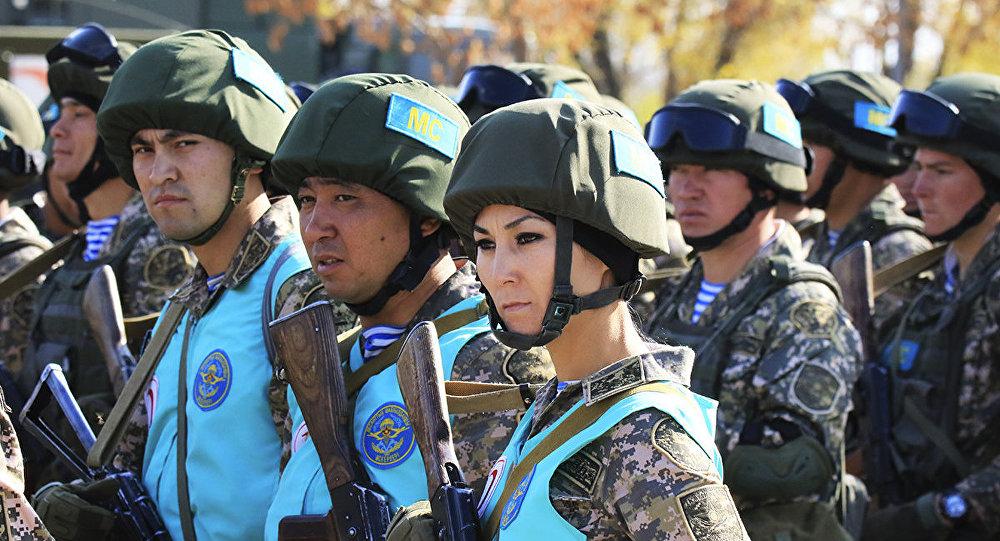Officials from Kazakhstan have announced the government’s intent to expand the country’s role in international peacekeeping missions led by the United Nations.
“We are looking to expand the geography of the peacekeeping missions, where our military observers and staff officers will be represented,” Colonel Erlan Akylbaev told UN News last week.
“In addition, we are aiming to send our mission of 170 people [to join any of the ongoing UN peacekeeping campaigns]. Currently, we are working to coordinate with the UN’s Department for Peacekeeping Operations.”
Kazakhstan joined UN-led peacekeeping activities in 2014 for the first time since the country gained independence from the Soviet Union in 1991. Since then, Kazakhstani troops have been sent on peacekeeping missions in Haiti, Western Sahara, Cote d’Ivoire and Liberia.
Since January five Kazakhstani officers have been serving a peacekeeping mission tied to the Referendum in Western Sahara, or MINURSO, according to the report issued by the UN’s Department for Peacekeeping Operations.
Caspian region nations have sent 94 officers last month, with 83 coming from Russia; Iran and Azerbaijan sent four and two officers respectively. Turkmenistan has never participated in UN peacekeeping missions.
For the first time ever, Kazakhstani women will be included in the missions, in order to meet UN standards, which require that 80 percent of the UN’s police contingent should consist of men, while 20 percent are reserved for women.
“Sure, there are women in our mission. They are mainly represented in such components as a medical segment and communication,” Akylbaev stressed.
Women are also presented in the KAZBAT-1 battalion, which was created in 2000 within Kazakhstan’s Airmobile Forces. This military unit can join any peacekeeping mission under the auspices of the United Nations. KAZBAT’s officers undergo annual training led by military experts from the U.S. and the U.K. within the Steppe Eagle international peacekeeping exercises.
Kazakhstan is not the only country in the region to provide women with the right to represent the nation in international peace campaigns. Russia was the region’s first country to start training women as UN military observers in 2017.
Such decisions came after the United Nations expressed the need for expansion of women presence in the peacekeeping missions to help to achieve peace in the countries and regions affected by conflicts.
“Women must play a far more active role in peace operations, as troops, police and civilian staff,” UN Secretary-General, António Guterres said during the Security Council’s thematic debate held on April 6, 2017.
“This is not only because gender parity is essential for its own sake, but because the involvement of women is proven to increase the chances of sustained peace, and to reduce incidences of sexual abuse and exploitation,” he added, referring to the UN peacekeeper child abuse scandal that broke out in 2016.







 Armenian sappers commenced on Monday mine-clearance operations in the territories adjacent to the Saint Mary Church in village of Voskepar (Armenia...
Armenian sappers commenced on Monday mine-clearance operations in the territories adjacent to the Saint Mary Church in village of Voskepar (Armenia...
 Russian Foreign Minister Sergei Lavrov has reasserted that Moscow has no intentions to stop the fighting in Ukraine, even if peace talks commence.
Russian Foreign Minister Sergei Lavrov has reasserted that Moscow has no intentions to stop the fighting in Ukraine, even if peace talks commence.
 Iran has refuted reports of alleged damage to Shimon Peres Negev Nuclear Research Centre located southeast of Dimona, Israel, during the recent air...
Iran has refuted reports of alleged damage to Shimon Peres Negev Nuclear Research Centre located southeast of Dimona, Israel, during the recent air...
 Iran’s Foreign Minister, Hossein Amir-Abdollahian, has labeled a foiled Israeli drone attack in certain parts of the country as a "failure" for Isr...
Iran’s Foreign Minister, Hossein Amir-Abdollahian, has labeled a foiled Israeli drone attack in certain parts of the country as a "failure" for Isr...



